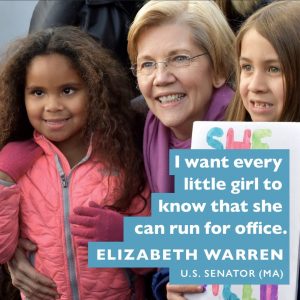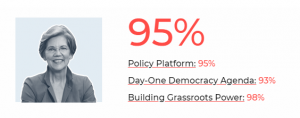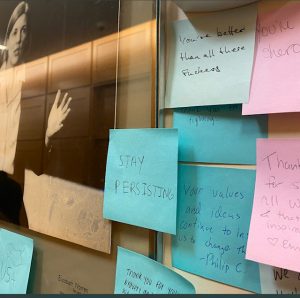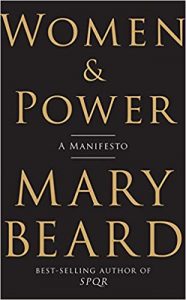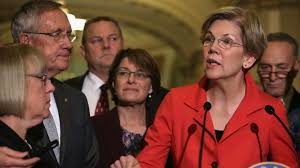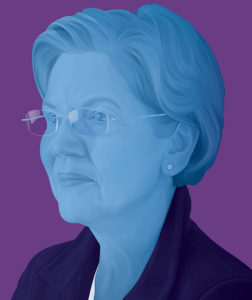Elizabeth Warren
?
March 20, 2020
|
|
|
Dayle, Our country is staring down the most difficult challenge we have faced since World War II. The coronavirus crisis poses a real threat to our health and economy, and requires a strong response — from our government, but also from each of us. It’s natural to feel overwhelmed or powerless at a time like this, but we all have the power to help slow the spread of the coronavirus by taking simple steps. Here are a few pieces of guidance the CDC is giving right now:
Keep an eye out for more updates from the CDC and from your state and local health departments for updated guidance. Even if you’re young and healthy, it is critical that you take all of these steps because they help protect the rest of your community. You’ll reduce the risk of unknowingly passing on the disease to someone else — someone older and less healthy than you who might become seriously ill if they contract the coronavirus. Think of the grandparents, cancer patients, and others out there who are counting on you to help keep them safe. Do everything you can to follow these guidelines and take care of yourself. And if you’re able, please take care of your friends, your family, your neighbors, and anyone around you who might need a little extra help — pick up groceries for an older neighbor or order takeout from a local restaurant that is struggling. But “social distance” doesn’t mean we should stop communicating. We need one another now more than ever. Keep checking in on people — texting, emailing, calling, video chatting, whatever works, and whatever keeps you talking with the people who make you strong. If we all take this seriously, we can limit the number of people who get sick all at the same time, and make it easier for our health system to deliver care to everyone who needs it. Taking action as individuals and as local communities is critical, but of course it’s not enough. Our government needs to step up and treat the coronavirus as the public health and economic crisis that it is. I’ve outlined an updated plan to do exactly that, including:
I’ll keep fighting in Washington to make sure our government takes this pandemic seriously and doesn’t use it as a giveaway to big companies that leaves everyday people behind. The Trump administration failed to prepare us for this pandemic. It’s more important than ever for us to each do our part as citizens to support one another. Now, I wish I could tell you that this crisis will be over by “X” date or within “Y” days. But the reality is we just don’t know. For a while, it’s going to be hard. For a lot of people, it’s going to be really hard. But it won’t last forever. And we do know this: When we look out for each other, we make each other stronger. We get through times like these when we fight side by side. Elizabeth |
Nevertheless, she persisted.
March 5, 2020A Not-So-Super Tuesday
By Connie Schultz
Last week, I sat on a stage in front of more than 200 women in Columbus, Ohio, and tried to answer a simple question.
I don’t remember exactly how interviewer Angela Pace asked it, but I heard it this way: What do you want your granddaughters to remember about you?
To my embarrassment, my eyes teared up and my voice began to quiver.
It’s been such a long three years.
We have seven grandchildren: four boys and three girls. I love them equally, as I made clear that day from the stage. But we were talking less than a week before Super Tuesday, when most political punditry had already congealed around two presumed front-runners, Joe Biden and Bernie Sanders.
Elizabeth Warren, the smart, talented, compassionate senator from Massachusetts, was already invisible, right before their eyes. Like millions of other women, I still see her and the hope she always brings with her. It’s as bright and crystalline as hydrangeas in the dusk’s light, glistening after a soft summer rain.
What do I want my granddaughters to remember about me?
My love for my grandchildren keeps my heart on the brink of combustion, but when I think of Jackie, Carolyn and Ela, ages 5, 4 and 2, something else kicks in; I can’t deny it. I’m old enough to know which dreams died but young enough to remember when I thought they defined who I — who we — would be.
I try never to lead with my injuries, but it’s one thing to work hard to get over a disloyal love. A heart can heal, after all. It’s something quite different when the betrayal never comes to an end.
Once again, it seems, we will have to wait at least another four years to see a woman sworn in as president of the United States.
“It’s not because she’s a woman,” people tell me.
“It’s because she’s that woman,” people tell me.
“It’s because of Hillary’s loss that it feels like a woman couldn’t win,” people tell me.
You can tell me and you can tell me and you can tell me — but let me tell you: There’s not a lie I haven’t heard about what a woman can and cannot do. At my age, every act of sexism and misogyny is an encore production.
Jessica Valenti, a brilliant feminist writer two decades younger than me, wrote this after Super Tuesday, for Medium:
“Even just supporting Warren has come with an unbearable amount of misogynist condescension. I’m tired of being told that I’m a single-issue voter because I care about a candidate’s gender, even if it’s not the only thing I care about. I’m over being made to feel as if representation for half the population isn’t a necessary and radical political position. I don’t appreciate being told that I’m either anti-revolution because I didn’t support Bernie Sanders or unrealistic because I won’t vote for Joe Biden. I especially resent the theory being bandied about that Warren somehow ‘stole’ votes from Sanders; it’s nonsense.”
If you had told me 20 years ago that we’d still be having this conversation about the limitations of women, the only thing I would have allowed you was a running start to get out of my way. Our daughters aren’t much younger than Valenti, which might be why these words of hers took my breath away:
“Whoever the nominee is, their campaign is going to have to come to terms with the intense misogyny so many female voters have dealt with — and understand that it’s an issue we care deeply about. And their supporters are going to have to let us be sad — depressed, even — that once again we’re going to watch a race to leadership between old white men.”
Will we vote for that nominee? Of course, we will, in droves. We love our country.
What do I want my granddaughters to remember about me?
All those little, big things. How much I loved them. How I kept a book of the smart and funny things they said. How I lined our walls with their photos, year after year.
Still, why did I cry?
Maybe it’s because I don’t take for granted that I will live long enough for them to have many memories of me.
Maybe it’s because I hope that, in their toughest moments, long after I’m gone, my persistent opposition to this president’s racism and misogyny will remind them that this is who we are, we women in this family.
Or maybe it’s simpler than that. Maybe I cried because I, too, needed a moment to be sad, after all these years.
Connie Schultz is a Pulitzer Prize-winning columnist and professional in residence at Kent State University’s school of journalism. She is the author of two non-fiction books, including “…and His Lovely Wife,” which chronicled the successful race of her husband, Sherrod Brown, for the U.S. Senate. Her novel, “The Daughters of Erietown,” will be published by Random House in Spring 2020. To find out more about Connie Schultz (schultz.connie@gmail.com) and read her past columns, please visit the Creators Syndicate webpage at www.creators.com.
https://www.creators.com/read/connie-schultz/03/20/a-not-so-super-tuesday
UPDATE
“DREAM BIG. FIGHT HARD.”
Ezra Levin, co-founder and co-executive director of Indivisible Team
“For the record, Warren was the top scoring candidate on Indivisible’s scorecard and would have been an incredible President.”
Elizabeth Warren’s tenured photo in the halls of Harvard University. Supporters and students left their comments for her on the day she suspended her campaign.
‘This is how human power can look.’
February 27, 2020“That idea that power cannot be accompanied by notions of compassion and kindness and empathy. That’s something that I refuse to accept.”
‘Picture a leader of a country and, chances are, you’ll picture a man.
This isn’t surprising. The majority of world leaders are men, so our ideas about the characteristics of leadership are so deeply ingrained, it’d take someone pretty outstanding to change them.
Far-right, ‘strongman’ rulers are on the rise around the world. But not in New Zealand, where Jacinda Ardern, the 39-year-old progressive prime minister, is challenging perceptions of what a leader should look like and showing us that society is ready for change.
This prime minister is showing the world that leadership isn’t a male trait. It’s a human one
Imagine a powerful person. The prime minister of a rich country, say, taking the stage for a press conference. Think of the voice, the dress sense, the way a prime minister speaks and sounds. Who do you see in front of you? Let me guess.
A man in a suit.
This is our reflex, our stock idea of a prime minister. It’s an image that plays tricks on many female politicians. Take Senator Elizabeth Warren, a prominent candidate in the Democratic primaries to select a challenger to Donald Trump, the US president, in elections in November this year. After a promising start in autumn 2019, Warren’s campaign has been plagued by loud speculation about her “electability”. She’s a woman, after all.
According to Warren, her rival Senator Bernie Sanders told her during a private conversation in 2018 that a woman can’t win in 2020. It’s a claim that Sanders has denied, but the grounds for such opinions are easy to find. In the 2016 presidential race, Hillary Clinton fought Trump in a tough, often sexist campaign. For all her political experience, the word went around that a woman was not “presidential” and hence not “electable”. The same assumptions have hurt Warren’s campaign.
Governments in Hungary, United States and Brazil are led by macho misogynists. In New Zealand, the opposite happened.
Is it credible in 2020 that women are still not electable to the highest level of power? If you follow the news, you’ll understand the roots of this question. Trump won in 2016 despite – or perhaps, thanks to? – numerous accusations of sexual misconduct and an audio recording of his infamous “Grab ’em by the pussy” comment during a tour of a television studio in 2005.
In New Zealand, the exact opposite happened.
Since 2017, the New Zealand government has been led by a woman who is still (until July) under 40 years old. Ardern’s victory can be compared to other recent political insurgents Barack Obama, Justin Trudeau and Emmanuel Macron.
It is a measure of international interest that “Jacindamania” has entered the political lexicon. At the same time, however, the same political climate has rained hatred upon Ardern. Her personal style has upset millennia-old ideas about men, women and power: ideas made visible by the sexist reactions which follow her.
The phenomenon of New Zealand’s second female prime minister shows how the prevalence of these ingrained cultural ideas and, thanks to Ardern and others, how such thinking can shift.
Her message is that people depend on one another – not on money, numbers or achievements.
[…]
Mary Beard, a British classicist, cites this incident in her 2017 book Women & Power, a history of misogyny from Athens and Rome to today. She begins with an account of Homer’s Odyssey, in which Queen Penelope, wife of Ulysses, is silenced in public by her newly grown-up son because “speech is a man’s business”. To Roman orators, high (female) voices expressed “cowardice”. For too many famous novelists, female voices resembled the mooing of cows or the braying of donkeys, sounds which polluted language.
Sharp, too high, unpleasant – the voices of female politicians or leaders would have ‘no authority’
Beard’s book describes a serial smear campaign against the female voice. She shows how prevailing ideas about eloquence and rhetoric are rooted in a classical tradition which dismissed female voices as an aberration. To this day, women are much more often said to be squeaking, whining, squawking, screaming or cackling. Or that their voices are “just uncomfortable” to hear. Like Warren’s, described by a journalist as “unbearably shrill”.
Warren gets it. Love, women, and intersectionality.
February 24, 2020‘I love my country, I love it very much. It is for that reason I do not makes excuses for it. If we think installing a hero is going to solve our problems, here is my warning now.
It won’t.
We NEED to BE the hero we seek in elected officials. Or else round and round we go.’
~Deina @sapereaude86
‘Political discourse is my Assignment. America is my Station. Love is my Religion’
‘Throughout her campaign, Warren has shown her ability to use intersectional approaches to analyze a wide variety of social ills & her engagement with this paradigm has only gotten richer as her campaign has progressed.’ By far, the best candidate for president.
Elizabeth Warren Is Running an Unapologetically Intersectional Campaign
As much as I want Medicare for All and for the rich to pay higher taxes, that won’t cure sexism. Warren gets that.
Another lesson of intersectionality has to do less with analysis and theory than with what we may call a politics of respectful attention. Taking intersectionality seriously means moving beyond merely acknowledging one’s own privilege and understanding that walking the walk entails listening to and learning from those who live in identities different from your own. Warren has exhibited this repeatedly, chiding other Democrats for only engaging with the black community during election time. Conversely, she met with Ta-Nehisi Coates—years before she became a presidential candidate—to learn from him following his explosive writing on reparations.
As Nelini Stamp writes in the newly radical Teen Vogue, “Elizabeth Warren is paying attention…. Her [environmental justice] plan is informed by the 17 Principles of Environmental Justice, an equity-based framework written by activists of color in 1991 that no presidential administration has acted on to date. Not anymore. Warren centers marginalized communities again and again in her plan.” And when Warren reads off the names of murdered trans women (not at a LGBTQ event!) and pledges to do so every year in the Rose Garden, she “brings the margin to the center” as bell hooks put it, making visible the ways in which race, class, gender, sexuality live in particular bodies in particular ways.
Being intersectional also means having to own up to mistakes, learn from those who live and love differently from you, step aside when necessary and step up when the situation dictates it. At a presidential forum on Native American issues in August, Warren addressed her own errors. “Like anyone who’s being honest with themselves, I know that I have made mistakes,” said Warren, presumably referring to her release of a DNA test purporting to show that she had Native American ancestry. “I am sorry for harm I have caused. I have listened and I have learned a lot, and I am grateful for the many conversations that we’ve had together.”
The key to robust intersectional thinking is to concretely demonstrate the ways in which things that seem to be about one concern are often inflected through others.
§ As Warren herself said in a tweet outlining her disability rights platform, “All policy issues are disability policy issues, which is why I’ve approached many of my previous plans with a disability rights lens, from criminal justice reform to ensuring a high-quality public education for all, to strengthening our democracy.”
§ When Warren addresses the debate about guns and links it to domestic violence, she is signifying precisely how a different angle of vision illuminates the connection between a culture of unfettered access to guns and a culture of violence against women.
§ During the New Hampshire debate, as the candidates discussed racial inequities in criminal justice and in wealth acquisition, Warren pointed out how her proposal to levy a wealth tax is not a simple “class” issue but in fact would address racial inequality in substantive ways by, for example, getting rid of student debt that unduly burdens people of color, who tend to be more in debt and take longer to pay it back.
§ On abortion, Warren made sure to point out the class and race dimensions, stating that if Roe v. Wade gets overturned, the rich (who are largely white) will continue to have access to reproductive services, while poor women and women of color will suffer.
§ She pivoted to condemn our history of discriminatory housing practices and make the point about the various ways in which racism informs pretty much everything, insisting that we can’t relegate “race” questions to some narrow aperture of vision.
§ In her plan on “Valuing the Work of Women of Color” (yes, she actually has a plan for that—a claim no other candidate can make), Warren acknowledges how the interplay of sexual and gender identities (as well as ability) with racial identities can exacerbate the obstacles women of color face.
§ In her plan on securing LGBTQ equality she highlights the connections between LGBTQ oppression and homelessness and increased risk of incarceration.
§ When discussing how to honor and empower Native people, she points out the centrality of anti-violence work for indigenous women who often go unprotected due to conflicts of tribal and federal governance.
[full read]
https://www.thenation.com/article/politics/elizabeth-warren-intersectional-campaign/
In lieu of SNL debate recap. #TikTok
https://t.co/eUMOKQ2xcEhttps://twitter.com/theferocity/status/1231936042346983424?s=20
When will it be enough?
February 19, 2020The Rush to Write Off Elizabeth Warren Is Making the Hillary Generation Furious
Progressive women feel they are being erased from the Democratic presidential primary
Should Elizabeth Warren drop out? On one level, it’s a natural question to ask after the one-time Democratic front-runner finished in a disappointing third place in the Iowa caucuses and fourth in her neighboring state of New Hampshire. In presidential politics, few candidates — male or female — ever survive the harsh consequences of underperforming.
On another level, the sentiment is utterly oblivious to the fury and hurt bubbling up among the millions of women who have supported Warren’s campaign. Three years after Hillary Clinton lost to Donald Trump,
the political class seems dangerously out of touch with women’s broiling resentment over the sense that being smart and competent won’t ever be enough.
I have spent many hours over the past three years interviewing, as part of a book project, a group of women who met as freshmen at the University of Michigan in the mid-1960s. Like many of their baby boomer peers, these women watched as men with equivalent levels of education — in some cases their own spouses — out-achieved and out-earned them. They straddled career and family obligations, exhausting themselves on the infamous “second shift” while husbands and male colleagues fired up the grill on summer weekends and then gave themselves the rest of the year off domestic duties.
For many of these women, electing Hillary Clinton was supposed to be a form of validation — a final, irrefutable sign that as complicated and frustrating and sometimes disillusioning as their adult lives had been, the general trajectory was toward progress.
But with Clinton’s defeat to a man most of them regarded as her intellectual and professional inferior, these women and their peers faced a pair of startling revelations. They might not live to see a woman elected president of their country. And the progress they had taken for granted might be reversible — or, worse, an illusion.
It’s enough to make a woman livid. Indeed, as the Democratic presidential primaries hurtle toward Super Tuesday with the once-formidable candidacy of Kamala Harris already ended and Elizabeth Warren all but forgotten by most of the press corps, thousands — perhaps even millions — of progressive women are surprising themselves with the depth of their pain and rage. They will not be erased. They are being erased.
Electing Hillary Clinton was supposed to be a form of validation — a sign that as frustrating and disillusioning as their adult lives had been, the general trajectory was toward progress.
It is an accumulation of outrages. Hillary Clinton reappears after the election to write a memoir and give speeches, and the Crooked Media bros want to know why she won’t just go away. Christine Blasey Ford endures death threats to testify against Brett Kavanaugh’s Supreme Court nomination, and is greeted by skepticism, mockery, and Kavanaugh’s own incandescent rage over having his nomination besmirched. Kamala Harris is dismissed as too angry after she takes on that nice old former vice president. Kirsten Gillibrand is branded a traitor for taking down Al Franken. Elizabeth Warren’s political obituary is written after all of two primary contests. And on it goes.
The profound well of anger is by no means limited to white baby boomer women. Younger counterparts talk about “2016 PTSD” or report that they’ve been “rage donating,” as the act of making angry political contributions has been dubbed in the age of Trump. But it is perhaps most intense among boomers, in part because many of them are now looking back at their lives through the lens of the last presidential election.
One of the most naturally optimistic of the baby boomer women I’ve been following is a woman named Linda, who recently retired after a long career as a pediatrician. When we spoke a few months after the 2016 election, she was disconsolate. “All the advances we thought happened and were secured, they were just gone,” she said.
To Linda’s mind, the outcome represented nothing less than the erasure of her entire generation, the women who came of age during the first blush of feminism and who had anticipated a Clinton victory as the validation of their own choices and sacrifices. She thought of her own struggle through medical school at a time when there were no locker rooms for female doctors, of the oncology career she gave up for her ex-husband, of the decades spent raising four children on her own.
The year before Linda and her classmates graduated from college, only about 30% of women her age expected to be working at age 35 — roughly the same percentage whose mothers worked. Five years later, the percentage of women in their late teens and early twenties who expected to be working at age 35 had nearly doubled. Their expectations about what their futures would bring had escalated faster than at any point in history, leading to what the economic historian Claudia Goldin has described as a social revolution.
For a while, reality played along. Women graduated from college and professional schools at increasing rates, and flooded the workforce.
But reality did not, in the end, deliver. By the mid-1990s, all the charts and graphs that had looked so promising in previous decades had begun to flatten, and in some cases even retreat. Today, fewer than 20% of partners at the top 200 law firms are women, even though law schools have been graduating roughly equal numbers of men and women for several decades. Fewer than 10% of Fortune 500 chief executives are women, even though more than 40% of business school graduates since the 1990s have been women.
The past three years have been a roller coaster ride for Linda’s generation. Though painfully wise to the ways that harassment and discrimination had stalled their own career prospects and weighed on their psyches, they were not prepared for the avalanche of testimony about routine assault and misogyny shared after revelations about the likes of Harvey Weinstein, Matt Lauer, and Les Moonves. The scale of it — the persistence of it — was shattering.
At the same time, the 2018 midterm victories for progressives were the result of women turning their grief and anger into activism, swamping campaign offices and maxing out donation limits with whatever they could spare. They ran for office in record numbers, too, winning a record number of seats in Congress. Women powered the resistance in suburban communities across the country, and turned an organization like Moms Demand Action for Gun Sense in America into a force that has gun rights activists back on their heels for the first time in decades. By the summer of 2019, there appeared to be an embarrassment of riches, with not just one, but five women running for the Democratic presidential nomination.
Now it’s very possible that none of them will end up facing Donald Trump in November. If that happens, this presidential cycle will have shown that even rage comes with a double standard attached. It can put a pampered former reality television star in the White House. But it can’t vault an eminently qualified woman like Elizabeth Warren or Kamala Harris to the top of a ticket.
Democratic operatives counting on millions of highly energized women to power their nominee across the finish line 2018-style would be advised to take notice of this. The stage of grief that typically follows anger is… depression.
https://gen.medium.com/amp/p/5feebe8b36ac
#Election2020
#ConsiderElizabeth
February 17, 2020“I was proud to fight beside Senator Reid and Barack Obama and to protect consumers—and I’ll keep fighting to protect consumers as president of the United States. Watch our new ad airing in Nevada now.”
[Follow the link to view :30 ad running in Nevada.]

